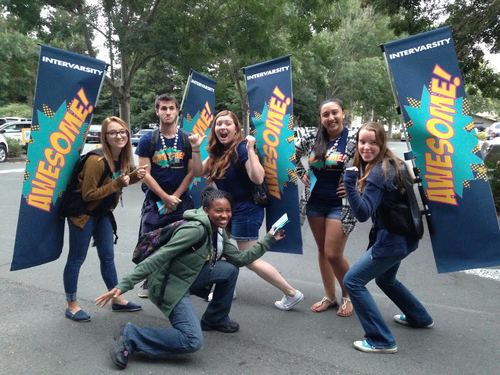
A group of student involved with InterVarsity Christian Fellowship, an evangelical Christian group with 860 chapters in the United States. Photo courtesy of Sonoma State Star
A trend on college campuses this past year goes by inviting slogan “all comers.” But even as the school year winds up, the controversy around “all comers” does not.
The idea is that college groups, including religious organizations, at publicly funded schools should allow “all comers” – no matter their faith or whether they are LGBT — in leadership if they want the funding and facilities offered recognized student groups.
However, a new LifeWay Research survey, released Tuesday (May 5), finds it’s not necessarily popular with all — or even most — Americans. They don’t want groups kicked off campus for clinging to their religious doctrinal views.
The survey was conducted in September, just weeks after an evangelical student group, InterVarsity Christian Fellowship lost recognition at 23 California college campuses after refusing to sign a required non-discrimination policy. The group does not permit non-Christians, gays and lesbians in leadership roles.
So far, InterVarsity’s 860 chapters have run into trouble with the “all comers” rules on more than 40 college campuses including Vanderbilt University, Rollins College and Tufts University.
LifeWay looked into the issue because of concern that “as ‘all-comers’ policies move from ivory tower campuses into society, watch for Christian groups churches to be among the first challenged for limiting membership and leadership only to believers,” said Ed Stetzer, executive director of Nashville-based LifeWay Research.
In a phone survey of 1000 U.S. adults, LifeWay asked, “Should student religious organizations, recognized by publicly-funded colleges, be allowed to require their leaders to hold specific beliefs?” Results were close: 48 percent said no and 46 percent said yes.
But if the same question was asked about private colleges, the answers shifted: 51 percent would favor letting groups set religious requirements for leadership roles and 44 percent would not.
The all-comers controversies are about behavior as well as belief, particularly about access to campus facilities for groups that refuse –generally on religious grounds – to allow gay and lesbian student leaders.
Only 38 percent say colleges “should only provide funding or meeting space to student organizations that allow gay and lesbian students to be in leadership roles” while 57 percent said schools should not make this a requirement.
However, when Lifeway asked if religious groups should be exempt from a requirement to permit LGBT student leaders, nearly one in three (29 percent) of those who favor the requirement would exempt religious organizations.
The survey was conducted September 19-28 and has a margin of error of plus or minus 3.4 percentage points.
It shows, “one person’s tolerance is another’s restriction. And one person’s religious freedom is another’s inappropriate discrimination,” said Stetzer. “We’re headed for a showdown over religion and rights — and it’s coming faster than anyone imagined… Indeed, tolerance of those whose religious views we find intolerant will test society’s tolerance in challenging ways.”




